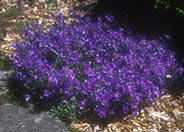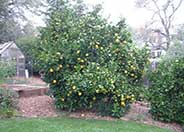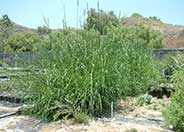

Common name:Boston Ivy
Botanical name:Parthenocissus tricuspidata
This deciduous vine grows leaves that are usually lobed and divided into 3 leaflets. It clings tightly to any surface.

Common name:Dalmation Bellflower
Botanical name:Campanula portenschlagiana
The Dalmation Bellflower is a mounding, deciduous perennial that forms a curtain of purple flowers often blooming in waves throughout the year. It should be grown in areas with sun to partial shade. -Monterey Bay Nursery

Common name:Endress' Cranesbill
Botanical name:Geranium endressi
This handsome tree has near-evergreen leaves which have a long blooming period.

Common name:Sweet Orange cultivars
Botanical name:Citrus sinensis
This tree will grow 20-30' high x 10-15' wide and produces sweet, tasty oranges. It has shiny green, leathery foliage and produces clusters of fragrant white flowers that bloom in the spring.

Common name:Needle Grass
Botanical name:Stipa pulchra
The needle grass is a cool season bunchgrass that grows 1-2 ft. tall with graceful, shiny flower stalks that reach 30 in. long in the spring. This grass is fire retardant, tolerates drought, and is good in mass plantings and restoration uses. The needle grass is California's State Grass and is a beneficial insect plant. -Cornflower Farms

Common name:Eastern Redbud
Botanical name:Cercis canadensis
This small, deciduous tree with a rounded head is covered with small flowers of a rose pink color in the spring before the appearance of heart-shaped leaves. It can grow to 25' tall with an equal spread. It has a low branching habit with a rounded form. Yellow fall colors.

Common name:Giant Wild Rye
Botanical name:Leymus condensatus
A prominent tall native grass that usually does not make its way into traditional residential landscapes but can be used very effectively in a native or natural garden. Reaches heights of 6-8' in bloom and will clump to 4-5' wide. Requires supplemental water to remain green in the summer. Too much water will cause the grass to decline significantly. Can be pruned annually to promote new, more attractive growth.
An efficient watering system applies the right amount of water to the right parts of the garden at the right time. This conserves water and saves you money.
Click in the green box for more information
| Designer: Connie Lefkowits | Grassy Front Yard |
Photographer: GardenSoft |
Maintain a two to four inch layer of mulch on the soil surface to reduce weeds, infiltrate rain water, and reduce compaction.
Develop healthy soil for plants that are vigorous and naturally pest-resistant.